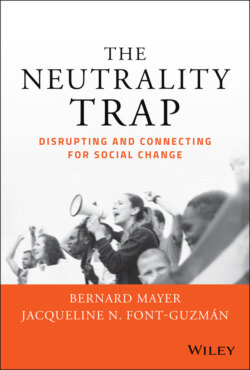Читать книгу The Neutrality Trap - Bernard S. Mayer - Страница 11
Disrupting and Engaging
ОглавлениеMany of us who have worked in the conflict field (e.g. as facilitators, mediators, peace builders, and trainers) also have backgrounds as social activists where raising the prominence of public conflict is central to the mission of promoting justice. Working to help people resolve their differences has often seemed like a logical and constructive next step. But what seemed like a natural progression has often meant losing the clarity of purpose that the previous focus on social change had provided. While the conflict intervention field has at times helped consolidate changes that social movements have generated, it has also sometimes undercut the energy necessary to build movements by focusing prematurely on dialogue, de‐escalation, and resolution.
The two of us have spent a significant part of our professional lives working to understand what drives conflict; the relationship between communication, emotion, power, culture, and structure; and the processes that can be used to support people in working through their conflicts in a constructive way. We have guided public dialogues, high‐stakes negotiations, and intense interpersonal interactions in organizations, communities, and families. Much of our work has involved trying to identify how people can resolve differences, arrive at solutions to seemingly intractable problems, and lower the level of tension and hostility in volatile situations. But in doing so we have also had to support people in raising difficult issues, accepting that some elements of their most important conflicts are not amenable to tangible short‐term solutions, and learning to mobilize and use their power effectively.
We have experienced some astonishingly and unexpected transformative moments in our work with others, but we know that profound change does not come easily, predictably, or by the mechanistic application of some formula for human interaction. We believe that just as the lessons we have learned as advocates for social change have informed our work as conflict interveners, our work on conflict sheds light on the struggle for social justice. What those lessons are and how they can be applied to the volatile world we inhabit is the focus of this book.
Three of the most important lessons we have learned are the vital role of conflict in breaking cycles of oppression, the importance of taking a strategic approach to long‐term conflict, and the danger that neutrality poses as a central guiding principle for the role that conflict interveners play in the change process. These lessons are relevant not only to conflict specialists but to all those working for social change.
